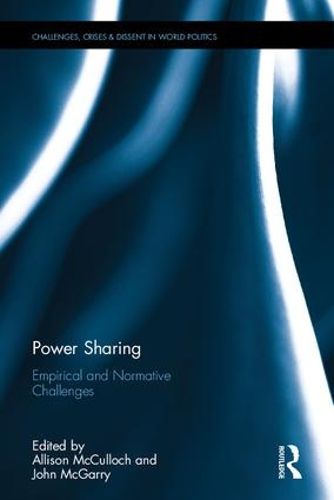Readings Newsletter
Become a Readings Member to make your shopping experience even easier.
Sign in or sign up for free!
You’re not far away from qualifying for FREE standard shipping within Australia
You’ve qualified for FREE standard shipping within Australia
The cart is loading…






Power-sharing is an important political strategy for managing protracted conflicts and it can also facilitate the democratic accommodation of difference. Despite these benefits, it has been much criticised, with claims that it is unable to produce peace and stability, is ineffective and inefficient, and obstructs other peacebuilding values, including gender equality.
This edited collection aims to enhance our understanding of the utility of power-sharing in deeply divided places by subjecting power-sharing theory and practice to empirical and normative analysis and critique. Its overarching questions are:
Do power-sharing arrangements enhance stability, peace and cooperation in divided societies?
Do they do so in ways that promote effective governance?
Do they do so in ways that promote justice, fairness and democracy?
Utilising a broad range of global empirical case studies, it provides a space for dialogue between leading and emerging scholars on the normative questions surrounding power-sharing. Distinctively, it asks proponents of power-sharing to think critically about its weaknesses.
This text will be of interest to students, scholars and practitioners of power-sharing, ethnic politics, democracy and democratization, peacebuilding, comparative constitutional design, and more broadly Comparative Politics, International Relations and Constitutional and Comparative Law.
$9.00 standard shipping within Australia
FREE standard shipping within Australia for orders over $100.00
Express & International shipping calculated at checkout
Power-sharing is an important political strategy for managing protracted conflicts and it can also facilitate the democratic accommodation of difference. Despite these benefits, it has been much criticised, with claims that it is unable to produce peace and stability, is ineffective and inefficient, and obstructs other peacebuilding values, including gender equality.
This edited collection aims to enhance our understanding of the utility of power-sharing in deeply divided places by subjecting power-sharing theory and practice to empirical and normative analysis and critique. Its overarching questions are:
Do power-sharing arrangements enhance stability, peace and cooperation in divided societies?
Do they do so in ways that promote effective governance?
Do they do so in ways that promote justice, fairness and democracy?
Utilising a broad range of global empirical case studies, it provides a space for dialogue between leading and emerging scholars on the normative questions surrounding power-sharing. Distinctively, it asks proponents of power-sharing to think critically about its weaknesses.
This text will be of interest to students, scholars and practitioners of power-sharing, ethnic politics, democracy and democratization, peacebuilding, comparative constitutional design, and more broadly Comparative Politics, International Relations and Constitutional and Comparative Law.